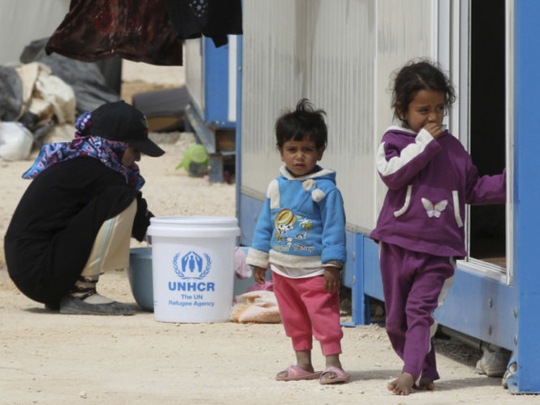
London: The crisis in Syria, which has left 5.5 million children in need of urgent educational and psychological support, will become an even greater humanitarian catastrophe if the international community does not come up with three years’ guaranteed funding, Unicef has warned.
Last month, the UN children’s agency said the number of children affected by the conflict had doubled over the past year, raising the prospect of a “lost generation” of Syrians who will be denied the education and opportunities needed to help them rebuild the country.
Maria Calivis, Unicef regional director for the Middle East and north Africa, said that although many countries had responded generously to the crisis with emergency funds, guaranteed money was vital.
“We’re calling for three years’ predictable funding, because education is an investment that you can’t do with funding on just a six-month basis,” she said. “We need sustained funding, we need to find cost-effective solutions and we need to make sure that all our interventions help to build resilience in families and communities because this is what will last and this is what will help the recovery. If we don’t, it will be a much bigger humanitarian catastrophe than it is now.”
Calivis, Unicef’s lead on the Syrian crisis, said the war was having an increasingly devastating effect on the country’s children, 3 million of whom are internally displaced and 1.2 million of whom have become refugees.
“Because it’s now lasted three years, you see among the refugees that have come across, that [the situation] is not what used to be even just a year ago, when in a group of maybe 25 children, 10 needed psycho-social support,” she said. “Now, 25 of the 25 children will need psycho-social support. That is an indication of how deeply it has affected children.”
As well as losing their relatives, homes and chances of a proper education, Calivis said, they also face the resurgent threat of polio 14 years after the last recorded case in Syria.
She said that although Unicef was doing all it could to protect Syrian children and to help them continue their education, it was a difficult task: some have taken to begging or working in fields or factories to help supplement their families’ income, and many girls are getting married earlier without finishing their schooling.
Though Unicef applauds the decision by Jordan and Lebanon to allow some Syrian refugee children into their public schools, it recognises that the move has caused overcrowding, put teachers under enormous pressure and led to resentment and bullying of the newcomers.
According to Calivis, Lebanon, whose public school system serves 300,000 of its own children, is now home to 300,000 Syrian children in need of education. Although it has accommodated 40,000 of them, the overwhelming majority have nowhere to go.
“It is a massive operation, but it’s possible with the support of governments and the coalition of partnerships and possible because of the demands of parents: this is something they want and they’ll do everything they can to send their kids to school,” Calivis said. “The question is: how do we sustain these levels of funding and because it’s an emergency, how do we maintain a sense of urgency?”
The agency hopes the host countries will take the lead by adopting a development approach to run alongside the humanitarian response, but acknowledges that urging them to invest in strengthening their own capacities and systems is asking a lot: “Many of the governments, because of the financial crisis, are facing large financial deficits their trade in the subregion has suffered; their tourism has suffered and therefore they are facing more and more fiscal debts.”
To make matters worse, the refugee population is putting a strain on resources such as water and electricity, just as the UN World Food Programme warns that a drought will threaten the already fragile food situation in Syria and the Middle East.
But the biggest single problem remains the lack of a political solution to the crisis in Syria. Without one, Calivis said, Unicef and others could do little more than bandage an ever-widening wound. “There is the risk of a generation of children that is growing up shaped by violence, by revenge, by displacement,” she said. “And this will have consequences not only for the families and for Syria, but also for the subregion.”
On Thursday, the British government announced that it was providing a further 20m to support the protection, counselling and education of Syrian children, and the international development secretary, Justine Greening, urged other international donors to honour their financial promises.
“Britain is committed absolutely to helping this traumatised generation get through this crisis as safely as possible and to supporting their education in order for them to have a future,” she said.
“But we cannot do this alone. Nations which have pledged aid must now deliver on their promises. The international community must come together and make it totally clear that their plight has not been forgotten.”
The UK has so far pledged 600m to help alleviate the Syria crisis.












